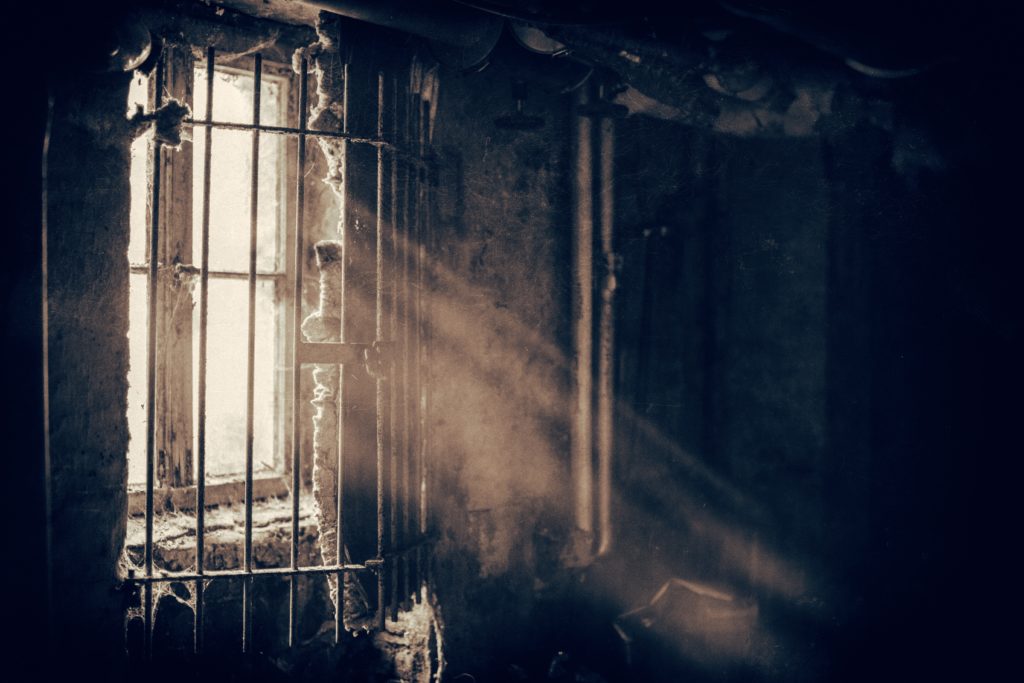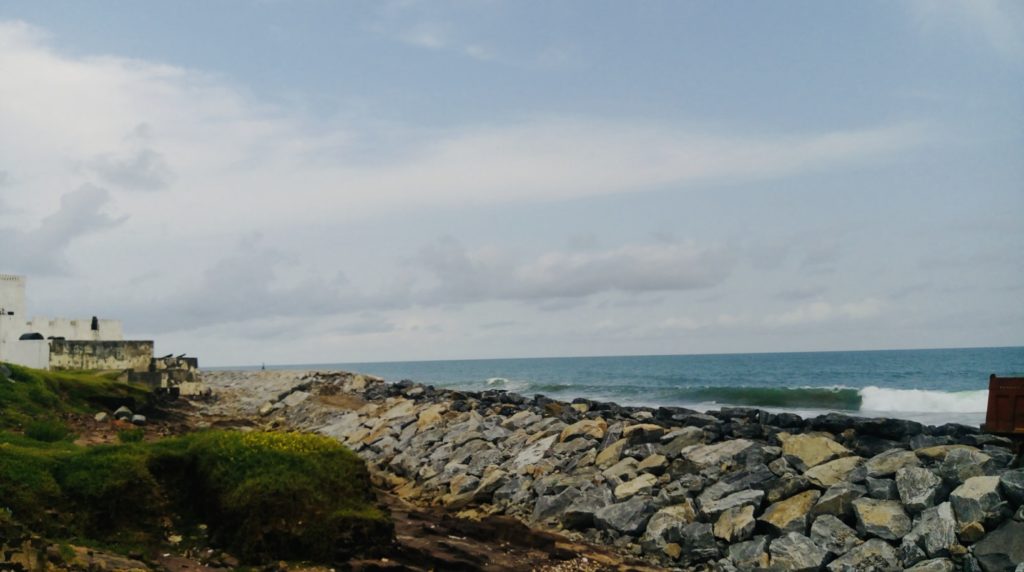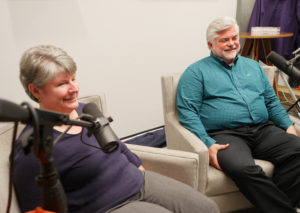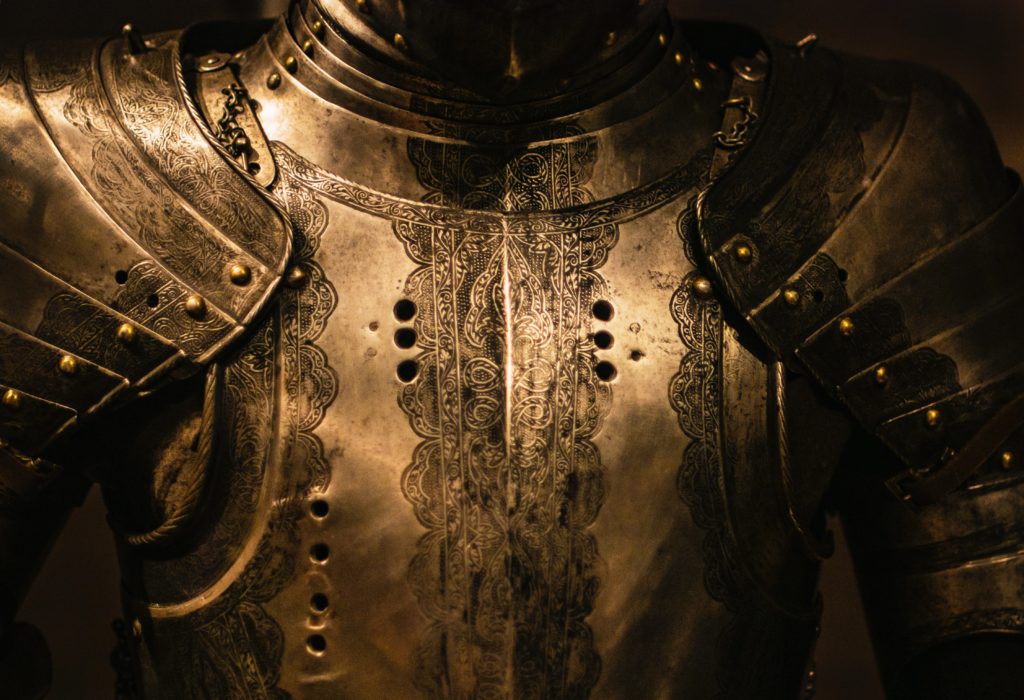Speaking Of Life 2043 | Belly of the Whale
Just like Jonah, have you ever been swallowed up? Alone in the dark, worried, confused, and afraid? Even in our darkest moments, God can reveal himself to us and fulfill the purpose he has for us through his Son.
Speaking Of Life 2043 | Belly of the Whale
Greg Williams
In 1891, in the black, cold waters off the Falkland Islands, a whaling boat was attacked by a giant sperm whale. One of the sailors went missing. A day later—or a few days depending on who you ask—the whale was captured and its stomach cut open. Here’s a report from one of the sailors on deck: “Out came a boot on a trousered leg and there was James Bartley….” His skin was bleached white and he was nearly blinded by the digestive acids in the whale’s stomach. He went on to live another 18 years and now rests under a tombstone which reads, “James Bartley – a Modern Day Jonah.”
Well, whatever you might think of this fascinating story, it certainly sticks in your mind. There’s been plenty of doubt cast on it, as well as several retellings that don’t quite add up, and yet it’s still an image that stays with us. Almost everyone knows the story of Jonah and the whale—a story that should make us think and rethink about the way we look at God and the way we look at our place in the grand narrative of the world.
Jonah is unique because it is essentially a story of a story. Most prophet books are about the words the prophet brings. This book is about the prophet who brings the words. The wider context is important: Jonah was sent to Nineveh to tell them to repent. Nineveh was a sworn enemy of Israel. Jonah didn’t want to see them repent and be saved from destruction, so he fled to sea. When a violent storm arose, he told the sailors he was to blame and they should cast him overboard.
He was swallowed by a whale and regurgitated on land three days later. He fulfilled the mission he was given and then got angry when the city repented and God forgave them.
He screams out at God at the end of the book:
But it displeased Jonah exceedingly, and he was angry. And he prayed to the Lord and said, “O Lord, is not this what I said when I was yet in my country? That is why I made haste to flee to Tarshish; for I knew that you are a gracious God and merciful, slow to anger and abounding in steadfast love, and relenting from disaster.
Jonah 4:1-2 (ESV)
Even after Jonah tried to commit suicide, God turns the whole thing on its head to get his merciful will done. The underlying message here is that God will use anything—even a lost whale with indigestion—to bring us, and others through us, to himself. That’s good news!
Have you ever been swallowed up? Spat back on the sand with your skin bleached white and your eyes nearly blinded? God can use every one of our belly-of-the-whale circumstances: addiction, challenging relationships, sickness, to meet us again and again. He can use anything to fulfill the purpose he has in you. So where and how is God meeting you?
I’m Greg Williams. Speaking of life.
Psalm 105:1-6, 37-45 • Exodus 16:2-15 • Philippians 1:21-30 • Matthew 20:1-16
The theme this week is the God who sustains us. In Exodus 16, we see Israel liberated from Egypt, sustained by God in the desert with the gift of manna. Psalm 105 is the hymn of praise about this exodus, retelling the story. Matthew 20 is the parable of the rich landowner who provides payment and sustenance to whomever he wishes. Philippians 1, on which our sermon is based, tells about God’s refreshing strength for us in a tired and broken world.
An Open Door in a “No Exit” World
Philippians 1:21-30 ESV
Read, or have someone read the text prior to the sermon:
Jean Paul Sartre, French atheist existentialist philosopher, wrote a play on the human condition called No Exit. This terrifying absurdist tale is about three people who end up in hell, but hell ends up being a locked room in which they can’t leave. There is no torture, no fire, but there’s also no change, no windows and no explanation as to where they are or what’s happening. They slowly drive each other crazy.
Each of them is escorted there by a mysterious valet who, chillingly, never blinks and provides only esoteric answers to their questions:
VALET: Can’t you see? The lights are on.
GARCIN: Ah, yes, I’ve got it. It’s your daytime. And outside?
VALET: Outside?
GARCIN: … you know what I mean. Beyond that wall.
VALET: There’s a passage.
GARCIN: And at the end of the passage?
VALET: There’s more rooms, more passages, and stairs.
GARCIN: And what lies beyond them?
VALET: That’s all.
{Sartre, Jean Paul. No Exit, Act 1, Opening Scene}
That’s all. And that, for Sartre, is hell and also the human condition on earth. No exit. No release. Every time we try to find release from this world in which everything gets old, everything tarnishes and frustrates, we just end up back in that locked room. Back in that place where there is no rest, and no one blinks. And outside of that room it’s just more of the same.

Paul is in prison as he wrote these words to the church at Philippi. He’s not necessarily in danger or being tortured, he’s even allowed visitors, but he cannot leave. Just like Sartre’s brutal metaphor for the human condition, Paul is in a place where his life might not be in danger, but he is deprived of his freedom.
It’s here that Paul writes what has been called “the happiest book of the Bible”! In a few chapters, he writes some of the most joyful encouragement in the New Testament, lifting up a small, disoriented community and calling them to God’s greater plan outside of their circumstances.
Let’s look at three points today from this passage and how we can learn from the imprisoned Paul, who was really free:
- True freedom
- True citizenship
- True perspective
True Freedom
For to me to live is Christ, and to die is gain.” (Philippians 1:21 ESV)
First, let’s look at Paul’s true freedom. The terror of Sartre’s play is not that they are tortured and even bothered by their captors—they simply don’t have their freedom. There is no relief. As Saint Augustine, one of our most well-known church fathers, said, “Lord, you have made us for yourself and our hearts don’t find rest until they rest in you.”
This play brings into sharp focus the unease of being human—we are driven to look for fulfillment and relief from the sameness of life but can never find it. New careers, new relationships, new intellectual pursuits—they all eventually get old and tired and we have to look for a new distraction. We can end up like Marie Antoinette, a princess who had more riches and power than any of us ever will, who said about her lavish world, “Nothing tastes.”
But true freedom is what Paul, and saints throughout history, have celebrated in Christ. It’s the freedom that we know we aren’t going to be fulfilled by this world and are made for another world. This is the key to the deeper, better, freer life we have in Christ that we cannot achieve by looking for relief in the No Exit world in which we live.
Knowing we will be complete only in Christ, and fully complete only when he comes again, allows us to live with a true freedom in this world. Further, this frees us from expecting our children, spouse, or job to completely fulfill us and deliver us from the “dailyness” of daily life. We can let these experiences and people be what they are.
C.S. Lewis describes our freedom in Christ: “A cleft has opened in the pitiless walls of the world, and we are invited to follow our great Captain” (The Weight of Glory). The door has opened in the terrible No Exit world.
So if the Son sets you free, you will be free indeed. (John 8:36 ESV)
Paul experiences this kind of freedom even more deeply. He’s come to the place where he’s completely free, even from the fear of death:
For me to live is Christ, and to die is gain. (Philippians 1:21 ESV)
Paul is truly free. Even death holds no fear for him, and life means the company of the Lord. In the end, he’s even free of his own desires. He wants to depart and be with Christ, but he stays there so he can serve others.
Do you know this freedom? This freedom from the windowless passage after passage that Sartre describes? And then to so live in the freedom that even death itself holds no fear?
The world offers it, telling us that a new relationship, a new look, a new pair of shoes will finally free us. But each time we end up back in that locked room. Christ is the key, the door and the only one who can open it.
True Citizenship
Only let your manner of life be worthy of the gospel of Christ, so that whether I come and see you or am absent, I may hear of you that you are standing firm in one spirit, with one mind striving side by side for the faith of the gospel. (Philippians 1:27, ESV)
To grasp Paul’s point here, we need to look at citizenship. It’s helpful to know the context in which Paul was writing at the time. Philippi was a Roman colony in Macedonia, and a community known for Roman nationalism. Retired Roman soldiers were a big part of the population—the symbol of their power, living on their pensions.
Roman citizenship, as we see in other places in Paul’s life, was a sought-after commodity. It meant better treatment by the soldiers, less taxes and other privileges and protections. It was also universal, at least in the ancient world. You could be a Roman citizen living or temporarily dwelling hundreds of miles from the city itself, and yet your citizenship rights would still hold.
Because of Paul’s interaction with communities occupied by Rome, he often used citizenship language. In Galatians, Ephesians, Colossians and other letters, he uses metaphors of citizenship. Paul reminds us that we are “citizens of heaven,” essentially a colony here on earth awaiting the return of the true emperor and king Jesus.
Early Christians used Roman language and imagery to convey the truth of the gospel regularly. Think of the title people gave Caesar as “kings of kings” and “lord of lords.” This title was taken by the Christian community to express the true power of Christ.
One of Paul’s main themes throughout his writing is this: “be WHO you already ARE.” He encourages us to fully embrace our royal strength and heritage in Christ, and to conduct ourselves as citizens of heaven on earth. His use of the term “citizen” here would be as scandalous as it was familiar. Even though we are citizens far from home, our rights and privileges are still in place. No matter where we are, we are to live as citizens of heaven, in a manner worthy of the gospel.
The verses preceding this section speak to the citizenship metaphor as well:
Yes, and I will rejoice, for I know that through your prayers and the help of the Spirit of Jesus Christ this will turn out for my deliverance, as it is my eager expectation and hope that I will not be at all ashamed, but that with full courage now as always Christ will be honored in my body, whether by life or by death. (Philippians 1:18-20 ESV)
Paul says here that he rejoices “with full courage.” This is a Greek phrase talking about the free, open speech enjoyed by citizens. He speaks with the confidence of someone who knows his true citizenship, despite being a prisoner and part of a small religious minority that no one had ever heard of at the time. His citizenship is in heaven. His job, his focus, is to honor Christ—now in this life as a citizen of heaven, and even by death, where he attains his full citizenship.
What does it mean to speak and live with this kind of confidence and freedom? What does it mean to live as citizens of heaven in our world? Do we embody a different set of values and navigate by different coordinates than those outside the gospel?
Here’s an odd example from the world of American fast food—not usually a place we think of as gospel-centered. The fast food chain Chick-Fil-A is famous, not just for good chicken, but also for being closed on Sundays. Founded by Christians and on Christian values, they felt called to close Sunday as a day of rest for themselves and their employees.
Some of the largest chains that compete with them, on every corner in the U.S., have commented that their business would have been devasted if Chick-Fil-A was open on Sundays. They wouldn’t be able to compete.
So even in the cutthroat world of capitalist food service, there is a simple witness for Christ. Despite a chance at more money and less competition, they have decided to use Sundays for rest and consequently allowed these other restaurants to continue to exist, showing the love and gentleness of a heavenly citizenship.
True Perspective
Finally, let’s look at true perspective. Again, Paul is in prison here, a Roman prison, which was no picnic. The prisons we have today look like four-star resorts compared with those in Paul’s day. You would imagine that Paul would rather be anywhere except prison. Yet he keeps things in perspective, and I believe this is one of the main points of this passage.
If I am to live in the flesh, that means fruitful labor for me. Yet which I shall choose I cannot tell. I am hard pressed between the two. My desire is to depart and be with Christ, for that is far better. But to remain in the flesh is more necessary on your account. Convinced of this, I know that I will remain and continue with you all, for your progress and joy in the faith, so that in me you may have ample cause to glory in Christ Jesus, because of my coming to you again. (Philippians 1:22-26 ESV)
It would be a lot easier to go to Christ—to be free of all the burdens of this life and to live fully in the kingdom and thus experience all the blessings of our true citizenship. However, Paul realizes what is best for him is not best for others. “To remain in the flesh is more necessary on your account.” Paul realizes God has called him to remain so that others will have “cause to glory in Christ Jesus.” He also realizes this is not an easy road—for him or for others who chose to follow Christ. So he tells them to live a life worthy, and then he tells them to not be frightened as they face suffering.
This is a clear sign to them of their destruction, but of your salvation, and that from God. For it has been granted to you that for the sake of Christ you should not only believe in him but also suffer for his sake, engaged in the same conflict that you saw I had and now hear that I still have. (Philippians 1:28-30 ESV)
Knowing your citizenship is in Christ, knowing your freedom is because of Christ, don’t allow your opponents or your fear to guide you. Yes, you will suffer for his sake, “engaged in the same conflict that you saw I had.” In spite of Paul being in prison and often suffering at the hands of those opposed to him, he never lost perspective. He realized his suffering was for the sake of Jesus. Because he loved Jesus, he suffered. Because he loved others, he suffered. His suffering was not just physical—it was primarily a heart issue. He grieved for others.
It’s a mistake to assume all references to suffering refer to dealing with physical harm. Suffering can be physical, we are quite aware of this, but Jesus’ suffering was not limited to the physical suffering he endured prior to his death. Jesus didn’t weep over Jerusalem because he was in physical pain, but because his heart hurt for those he loved. He felt the pain of desertion when the disciples fled from the Garden of Gethsemane, and he grieved over Peter’s denial, but it wasn’t grief just for himself. Jesus never lost the true perspective that he came for others. He grieved because he knew the guilt and shame Peter would feel. He grieved and suffered over the lack of faith he saw, knowing what the disciples and others would face in the days, weeks and years ahead. His heart broke over the lostness he saw in others, the searching and not finding. He suffered because he loved.
How many times have we shed tears over our children because we know the decisions they make and the paths they choose will cause them pain? How often do we cry over the suffering of others because they believe there is no hope and no help—because they have placed themselves in a metaphorical No Exit room.
Paul reminds us to keep a true perspective on things. This is not our world. The suffering we face is temporary. We can’t save or fix ourselves, and we can’t save or fix others—only Jesus can.
When you find yourself in Sartre’s No Exit room, put your mind back where it belongs. Of course that new job isn’t fulfilling every last dream you’ve ever had; of course your spouse occasionally has bad breath and tells boring stories; of course your church is full of broken, imperfect people—nothing in this world is perfect! Nothing was ever meant to be! Our only fulfillment, our only relief and release, is in Christ. Said another way, our only freedom, our only citizenship, our only perspective is in Christ.
Paul’s word to us is to keep this reality in focus. Keep your mind, which you can control, on your heavenly citizenship despite your circumstances, which you can’t control.
I’ll repeat C.S. Lewis’s image for us from his sermon The Weight of Glory: “A cleft has opened in the pitiless walls of the world, and we are invited to follow our great Captain.” The world will take you from locked room to locked room, never a break in the wall. As tempting as many escapes look, each one will just bring you back there.
But with Christ, there is a knock and the lock is finally turning. With Christ there is relief. An open door in a No Exit world.
Questions for Speaking of Life:
- Has God ever used a circumstance or a person you didn’t suspect to draw you back to himself? To help put your feet back on the path?
- Jonah never repents of his anger toward God; at least we have no account of it. What can his short, strange story tell us about ourselves?
Questions for Sermon:
- Read again the chilling passage from Sartre’s play No Exit. Does it resonate with you at all? How does it make you feel?
- “For me to live is Christ” (Phil. 1:21). “I have come that they may have life and have it abundantly” (John 10:10). This theme of LIFE appears over and over in the gospel. What do we make of it? How does this respond to the suffocating image that Sartre presents?
- Only Christ brings true freedom. Our citizenship is not of this world. How does this change of perspective, not necessarily circumstance, change us as people? How does it rewrite our story? How does it change the way we look at others?
Quote to ponder: “People tethered to God by faith can let themselves go because they know they will get themselves back.” Cornelius Plantinga, American theologian



 The apostle Paul pierced the understanding of the thought leaders in Athens by teaching them about the God who, “From one ancestor he made all nations to inhabit the whole earth…so that they would search for God and perhaps grope for him and find him—though indeed he is not far from each one of us.” (Acts 17:26-27, NRSV). Through their own poets, he taught these learned people that in God, humans “live and move and have our being” because we are “his offspring.”
The apostle Paul pierced the understanding of the thought leaders in Athens by teaching them about the God who, “From one ancestor he made all nations to inhabit the whole earth…so that they would search for God and perhaps grope for him and find him—though indeed he is not far from each one of us.” (Acts 17:26-27, NRSV). Through their own poets, he taught these learned people that in God, humans “live and move and have our being” because we are “his offspring.”






